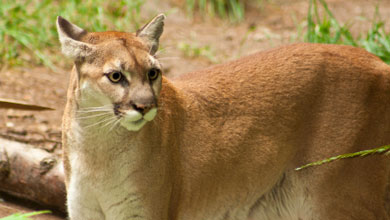Cougar season

Cougars naturally occupy the southern third of British Columbia and occasionally stray into residential areas. Cougars are meat eating predators whose actions are unpredictable and often dangerous.
The Integrated First Nations Unit encourages you to learn and follow cougar safety guidelines offered by the BC Ministry of Environment. Cougars can be especially dangerous to small children, as the children’s higher voices, more erratic movements, and size make it more difficult for cougars to identify them as human and not prey.
Children
- Talk to children and teach them what to do if they encounter a cougar.
- Encourage children to play outdoors in groups. Supervise children playing outdoors.
- Consider having a dog for your children as an early-warning system. Dogs can see, smell, and hear cougars sooner than we can. Dogs will not deter a cougar from attacking, but may distract a cougar from attacking a human.
- Consider fencing around play areas.
- Keep a radio playing.
- Make sure children are home before dusk and stay inside until after dawn.
- If there have been cougar sightings, escort children on early morning trips like walking to the bus stop.
- Ensure gathering areas like bus stops have adequate lighting and at least a nine metre (30 foot) radius clear of shrubs and trees.
Your yard, home, and pets
- Do not attract or feed wildlife, especially deer or raccoons. These are natural prey and may attract cougars.
- Roaming pets are easy prey. Bring pets in at night or if they must be left out, confine them in a kennel with a secure top.
- Do not feed pets outside. This not only attracts young cougars, but also many small animals, such as mice and raccoons that cougars prey upon.
Hiking
- Hike in groups of two or more. Make enough noise to prevent surprising a cougar.
- Carry a sturdy walking stick to be used as a defensive weapon if necessary.
- Keep children close at hand and under control.
- Watch for cougar tracks and signs. Cougars cover unconsumed portions of their kills with soil and leaf litter. Avoid these food caches.
- Cougar kittens are usually well-hidden. However, if you do stumble upon cougar kittens, do not approach or attempt to pick them up. Leave the area immediately, as a female will defend her young.
If you meet a cougar
- Never approach a cougar. Although cougars will normally avoid a confrontation, all cougars are unpredictable. Cougars feeding on a kill may be dangerous.
- Always give a cougar an avenue of escape.
- Stay calm. Talk to the cougar in a confident voice.
- Pick all children up off the ground immediately. Children frighten easily and their rapid movements may provoke an attack.
- Do not run. Try to back away from the cougar slowly. Sudden movement or flight may trigger an instinctive attack.
- Do not turn your back on the cougar. Face the cougar and remain upright.
- Do all you can to enlarge your appearance to the cougar. Don't crouch down or try to hide. Pickup sticks or branches and wave them about.
- If a cougar behaves aggressively, arm yourself with a large stick and throw rocks. Speak loudly and firmly. Convince the cougar that you are a threat not prey.
- If a cougar attacks, fight back! Many people have survived cougar attacks by fighting back with anything, including rocks, sticks, bare fists, and fishing poles.
Effective management of wildlife helps ensure safety of humans and animals. Bears or cougars lured into residential areas by easy meals of garbage or other attractants lose their natural fear of humans. Such animals are then much more likely to have to be destroyed when they pose a direct risk to human life.
For more information, visit the BC Conservation Officer Service website.
- Date modified: